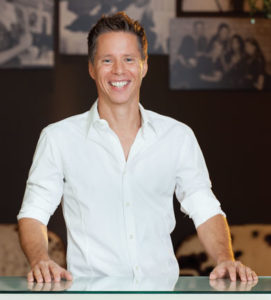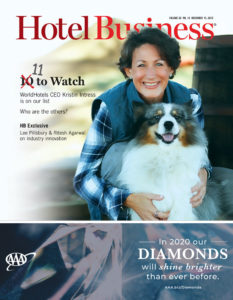 It’s not a new story: Former property-level hospitality workers rise through the ranks, taking those invaluable lessons learned with them and landing leadership roles. Alastair Thomann, CEO of Generator, is no stranger to this story. A once part-time bellboy, Thomann not only stayed, but climbed the hospitality ladder, not because it was his passion from day one, but because of the people.
It’s not a new story: Former property-level hospitality workers rise through the ranks, taking those invaluable lessons learned with them and landing leadership roles. Alastair Thomann, CEO of Generator, is no stranger to this story. A once part-time bellboy, Thomann not only stayed, but climbed the hospitality ladder, not because it was his passion from day one, but because of the people.
“I think people decide to work in hospitality because we love the industry and the opportunity it gives us,” Thomann said. “I’ve been in other industries that were hospitality-related but not real hospitality companies, and it just wasn’t the same.”
It wasn’t hospitality from the start for the CEO, however, but he quickly caught the industry fever during his time at school studying hospitality management and traveling across
the globe.
“That started my love affair with the service industry,” he recalled. “It’s very infectious. Once you’re in the industry, you stay.”
And surely Thomann stayed, working at the property level, then in a consulting capacity, and most recently as managing director of Pentahotels before moving on to Generator.
It’s without a doubt that Thomann took some of those lessons along with him, now heading up the hostel brand; however, Generator is moving away from this label, especially as it integrates into North America.
“We came into the U.S. very blue-eyed, operating a mix of shared and private-room concepts, and we learned how to position our property,” he said. “We took the hostel name away because we were surprised by the negative connotation hostel had in the U.S. We figured it would be fantastic to describe the hostel vibe we have in our public areas, but that is actually really off-putting for a U.S. customer. Although they may enjoy it when they stay with us, it’s not necessarily something they view as a positive.”
Generator’s two U.S. locations—its first in Miami and a second planned conversion to open next year in Washington, DC—are catching on to the concept, however, which Thomann predicts to become the new norm.
“You’ve got to look at the big-box operators that have a brand in every segment and that come up with more and more brands targeting very exact guests. I don’t think they’re necessarily interested in their product becoming more flexible because they have an offering for each segment,” he said.
Generator, offering accommodations from shared to private rooms, to suites to long-term options, is the opposite.
“We have the ability to go after everyone from the corporate guest, to the school group, to the long-stay guest who’s looking for an apartment because of a six-month project in a certain city, to a high roller who’s looking for a suite,” Thomann said. “All of these different segments have peak and off-season periods. That makes us much less vulnerable to the highs and lows in the market and one of the reasons why, overall, we’re running at about an 85% occupancy in markets that don’t necessarily do that; we can pick and choose the market segments we go after according to the time of year.”
The CEO predicts that independent or smaller brands that aren’t part of these big conglomerates will realize more and more that it’s worth being able to attract and target more than one guest segment, meaning we’ll be seeing more shared rooms and long-term options.
Generator has implemented room categories, meaning during certain times of the year when there’s a strong demand for shared accommodations, it can convert private rooms to shared. The same is true during strong corporate seasons that drive an older clientele that spends more; Generator can increase the number of private rooms.
“We’re really targeting those other segments that aren’t the typical hostel guest—corporate groups and events,” Thomann said. “At the end of the day, it’s all about maximizing the return.”
Helping Generator do this is Freehand Hotels, a U.S.-based lifestyle brand, owner and operator, after Generator acquired the company in October. Queensgate Investments—which acquired Generator in 2017—completed the transaction for $400 million.
Freehand has an established U.S. presence with four hotel assets in Manhattan, Miami Beach, Downtown Los Angeles and Chicago.
“We have a very similar DNA, but Freehand is more of an elevated brand,” Thomann said, adding that Freehand guests have an average age about five to 10 years older than Generator’s, are more established in the corporate segment and are in North America.
“This will help with the U.S. sales infrastructure and the customer base,” Thomann said. On the other hand, Generator will help integrate Freehand into Europe.
In the U.S., Thomann said Generator is already seeing a much more diverse and older customer base in Miami than in Europe since opening last year.
“It’s too early to say if that’s because of Miami and the type of guest who goes there, but we are very surprised how popular the shared-room offering is there,” he said. “We’re 50-60% above the average rate we expected to achieve in our shared accommodation, but this is based on one operating property, so we can’t draw any conclusions for the U.S. market.”
Regarding the Freehand acquisition, Thomann added that the two sales teams will work very closely but keep the two brands distinct. He also said they will be reducing the two head offices to one, in hopes to increase synergy.
Thomann expects the acquisition to not only propel Generator’s efforts but influence other companies as well.
“I think you’re going to find big operators entering this segment and professionalizing,” he said.
For the CEO, he continues to appreciate the hospitality industry as a whole as a place that fosters both camaraderie and opportunity.
“I think I got into this position here by fluke, by chance,” Thomann said. “I’ve been very lucky to have so many people who have put up with me for so long and made it easy to deliver these kinds of results. It’s all about having the same teams, the same key people around you.” HB

